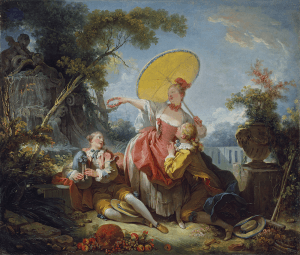Lewis H. Lapham in Lapham’s Quarterly:
 The storms of rivalry and feud currently blowing through America’s internet portals rise to the wind-scale force of Wagnerian opera, but it’s hard to know whether the sound and fury is personal, political, or pathological. The stagings of vengeful lies to destroy a graven Facebook image, or the voicing of competitive truth that is the vitality of a democratic republic? The problem doesn’t yield to zero-sum solution. Hesiod’s twin Strifes are permanent members of the human condition; neither of them can be impeached. The pagan Greek poet was clear on the point. During his own lifetime, he was familiar with the news and fake news of the Trojan War wandering around on the eastern Mediterranean lecture circuit, and he would have known that cursed Strife “brings forth discord, nurtures evil war,” killed Hector, Agamemnon, and Achilles, bears “great honors to…gift-guzzling kings”; known also that blessed Strife launched a thousand ships, “spurs a man who otherwise would shirk” to surpass his neighbor in “racing to reach prosperity.” The difficulty is the knowing which one is which, with which one a man is better advised to keep company—with “mischief making,” “eavesdropping in the marketplace,” and the “spying on quarrels,” or trying to do his best with the Strife that is nearer to hand.
The storms of rivalry and feud currently blowing through America’s internet portals rise to the wind-scale force of Wagnerian opera, but it’s hard to know whether the sound and fury is personal, political, or pathological. The stagings of vengeful lies to destroy a graven Facebook image, or the voicing of competitive truth that is the vitality of a democratic republic? The problem doesn’t yield to zero-sum solution. Hesiod’s twin Strifes are permanent members of the human condition; neither of them can be impeached. The pagan Greek poet was clear on the point. During his own lifetime, he was familiar with the news and fake news of the Trojan War wandering around on the eastern Mediterranean lecture circuit, and he would have known that cursed Strife “brings forth discord, nurtures evil war,” killed Hector, Agamemnon, and Achilles, bears “great honors to…gift-guzzling kings”; known also that blessed Strife launched a thousand ships, “spurs a man who otherwise would shirk” to surpass his neighbor in “racing to reach prosperity.” The difficulty is the knowing which one is which, with which one a man is better advised to keep company—with “mischief making,” “eavesdropping in the marketplace,” and the “spying on quarrels,” or trying to do his best with the Strife that is nearer to hand.
Machiavelli during his lifetime was personally acquainted with the cursed Strife inflicted on Florence by gift-guzzling Medici princes, also with the bonfiring of the city’s beloved vanities at the behest of Friar Girolamo Savonarola, a vengeful Dominican monk preaching the word of God as a howl of rage against the world, the flesh, and the devil. The history books tend to portray Machiavelli as a cynical Italian courtier supplying despots with murderous raisons d’état. The spin is travesty. Machiavelli was an idealistic civil servant who was also a poet and playwright seeking to provide early sixteenth-century Florence with a republican form of government. He rated the task as the most worthy of human endeavors when supported by a citizenry animated with the will to act instead of the wish to be cared for. To promote his effort to equip Florence with a civilian militia, and acting on his authority as second chancellor of the Florentine republic, Machiavelli in 1503–4 encouraged both Michelangelo and Leonardo da Vinci to burnish the walls of the Great Council Hall with the scene of a famous battle in which the free city of Florence defeated a rival city dependent for its freedoms on hired mercenaries.
More here.
